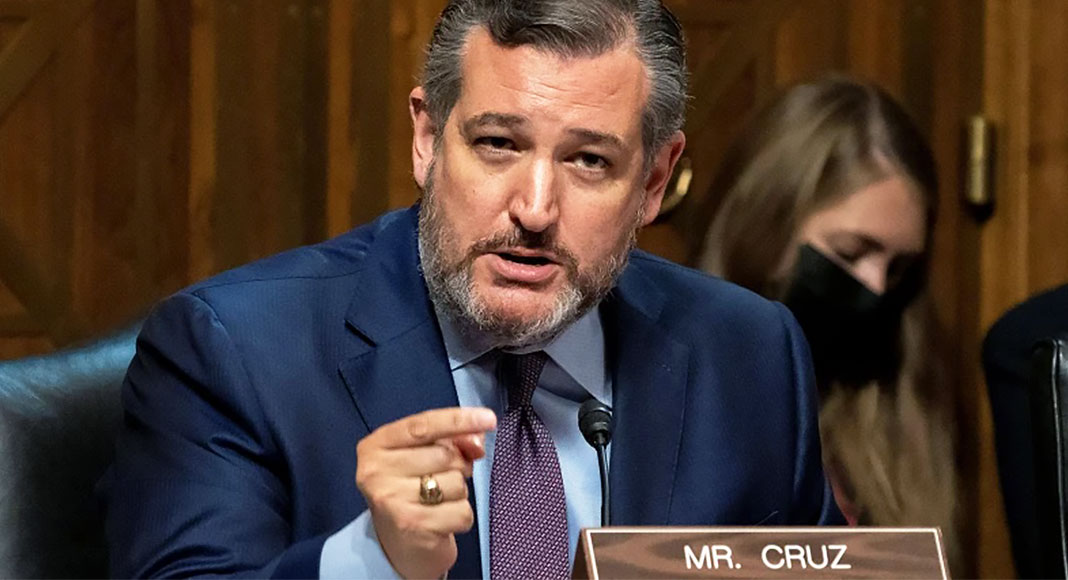
Texas Border Business
WASHINGTON, D.C. – U.S. Sen. Ted Cruz (R-Texas), member of the Senate Foreign Relations Committee, spoke to The National Review’s Jimmy Quinn about his leadership in the Senate urging President Biden to impose Congressionally mandated, bipartisan sanctions on Russia’s Nord Stream 2 pipeline—a project that if completed would threaten the national security of the United States and our allies. In response to President Biden’s refusal to impose these sanctions, Sen. Cruz is holding several of President Biden’s nominees for the State and Treasury Departments.
In the article, Jimmy Quinn wrote:
“In an interview with National Review last Friday, Cruz fired back, hitting Biden’s ‘capitulation’ to Putin, Senate Democrats’ hypocrisy, and the media’s wrongheaded reporting on his stance: ‘The next dictator in Russia will be reaping the rewards of Biden’s unilateral surrender, and those billions will be used to fuel Russia’s military buildup, hostility, and aggression directed at Europe, directed at America and our allies.’
“The Senate Foreign Relations Committee this afternoon moved 33 additional nominees to the Senate floor, setting up a showdown. By all indications, Cruz sounds ready to stand his ground, but in his interview with NR, he also reiterated an offer that he recently extended to the Biden administration as a way to resolve the standoff: He just wants a congressional vote on the administration’s policy. That offer is based on a sanctions law — the Countering America’s Adversaries Through Sanctions Act — that requires the president to sanction entities involved in Nord Stream 2, or else attempt to waive the required penalties via a congressional vote.
“‘If they follow the statute, it triggers an automatic vote in Congress on a congressional override, and what I told the administration in writing a month ago is that if they comply with federal law and trigger that congressional override, I’ll lift the hold on the career State Department nominees and the Treasury nominees the instant they trigger that vote,’ he says.”
[…]
“Cruz told NR, however, that he thinks that it’s the Democrats who are motivated by politics, as they pull their punches while the White House advances a policy that Democrats themselves see as damaging to U.S. national security.”
[…]
“Cruz also cites inaccurate reporting about the scope of his holds. He told NR that he currently has holds on 18 of the president’s nominees to posts at the State Department and Treasury Department, a number that’s likely to go up when the latest nominations reach the Senate floor. The New York Times, which initially reported on October 2 that Cruz was blocking 59 nominees, issued a correction last week to clarify that holds could ‘potentially’ be placed on 59 of Biden’s nominees.
“‘They had to correct it because the State Department’s talking points are laughably wrong — the Biden administration has been incredibly slow in making nominations,’ Cruz says. ‘The Senate Democrats have not prioritized confirming those nominees. So the overwhelming majority of the delay is due to their own incompetence. And they somehow think planting these stories will make me acquiesce to Joe Biden’s capitulation to Russia.’”
Read the full article featuring Sen. Cruz’s interview here and below. Watch Sen. Cruz object on the Senate floor here.
Cruz Defends Senate-Nomination Blockade over Biden’s Russia ‘Capitulation’
National Review
Jimmy Quinn
October 19, 2021
In an interview with NR, the Texas senator fires back at smears from the White House, Senate Democrats, and the media over his stand against a Russian pipeline.
President Biden’s refusal to stand in the way of Russia’s Nord Stream 2 pipeline has earned him rebukes from America’s Eastern European allies and members of Congress on both sides of the aisle. Biden and his team agree with the critics’ central objection — that it’s a malign influence project that will increase the Kremlin’s leverage over its neighbors. But they argue that imposing tough sanctions on the pipeline, which runs over 750 miles under the Baltic Sea to Germany, would anger Berlin.
Quite possibly the only person with the leverage to force the administration to change its stance is Ted Cruz. The senator from Texas is blocking several of Joe Biden’s nominees to diplomatic posts and other positions until the Biden administration relents and imposes congressionally mandated sanctions.
His stance has provoked a furious reaction, though, even from Senate Democrats who agree that the pipeline needs to be stopped before it becomes operational. His blockade has earned him the ire of those lawmakers, the White House, and major newspapers for, as the Washington Post editorial board wrote, “putting sand in the gears of government” and displaying an “indifference to the hard work of maintaining U.S. leadership abroad.”
In an interview with National Review last Friday, Cruz fired back, hitting Biden’s “capitulation” to Putin, Senate Democrats’ hypocrisy, and the media’s wrongheaded reporting on his stance: “The next dictator in Russia will be reaping the rewards of Biden’s unilateral surrender, and those billions will be used to fuel Russia’s military buildup, hostility, and aggression directed at Europe, directed at America and our allies.”
The Senate Foreign Relations Committee this afternoon moved 33 additional nominees to the Senate floor, setting up a showdown. By all indications, Cruz sounds ready to stand his ground, but in his interview with NR, he also reiterated an offer that he recently extended to the Biden administration as a way to resolve the standoff: He just wants a congressional vote on the administration’s policy. That offer is based on a sanctions law — the Countering America’s Adversaries Through Sanctions Act — that requires the president to sanction entities involved in Nord Stream 2, or else attempt to waive the required penalties via a congressional vote.
“If they follow the statute, it triggers an automatic vote in Congress on a congressional override, and what I told the administration in writing a month ago is that if they comply with federal law and trigger that congressional override, I’ll lift the hold on the career State Department nominees and the Treasury nominees the instant they trigger that vote,” he says.
He also says that “more than one Senate Democrat” has called his compromise “reasonable,” and has “urged the administration to accept it.” But Biden’s team hasn’t shown any interest in compromising, and Cruz blames “the political operatives at the White House” for refusing to play ball.
Indeed, the administration knows that Republicans and Democrats have united against the pipeline and would certainly override any attempt to waive the sanctions. So the administration’s best bet is to avoid that vote as long as it can.
In May, as is required under a different sanctions law, the State Department found that the Nord Stream 2 corporate entity and its German CEO are engaged in sanctionable activity, but it still waived the ensuing sanctions. At the time, the pipeline was more than 90 percent complete, and the waivers all but ensured its completion, which came about late, in September. The pipeline now awaits EU regulatory approval, which Moscow is trying to expedite by withholding gas flows to Europe, a move intended to extract concessions by exacerbating the continent’s energy-supply crisis.
There’s widespread bipartisan opposition to the administration’s policy toward Nord Stream 2, but a number of Senate Democrats have nonetheless ripped into Cruz’s effort to block Biden nominees. During a hearing in June, Senate Foreign Relations Committee chairman Bob Menendez slammed Cruz: “Maybe it’s your presidential aspirations — I don’t know — but you’re turning to political purposes.” And last month, Cruz went toe-to-toe with many of them on the Senate floor during a late-night session to debate and vote on senior State Department nominations over Cruz’s objections. Senate majority leader Chuck Schumer panned Cruz’s “irrational stonewalling.”
Cruz told NR, however, that he thinks that it’s the Democrats who are motivated by politics, as they pull their punches while the White House advances a policy that Democrats themselves see as damaging to U.S. national security.
“A point that I have made to my Democratic colleagues many, many times, both on the floor of the Senate and also privately in conversations, is that when we had a Republican president, Donald Trump, I was not remotely shy in leaning in vigorously against the Trump administration to urge them to fully implement these sanctions, which they did,” he says. “And there was meaningful resistance within the Trump administration to fully implementing these sanctions. Ultimately, President Trump and the administration did so.”
“But a question I’ve asked my Democratic colleagues repeatedly: Why are they so unwilling to stand up to their own party’s president?”
It’s worth noting that Cruz’s blockade isn’t an absolute one. He emphasized that, since the start of the Biden administration, he has been holding regular conversations, “sometimes even daily,” with the State Department. When Antony Blinken, soon after his confirmation as secretary of state, expressed a willingness to work with Cruz, the two of them “negotiated incremental releases of those holds in exchange for incremental improvements in their policy,” Cruz says. And Cruz took credit for Blinken’s release of a “strong statement” in March condemning the pipeline and vowing to impose sanctions on the entities involved in its construction. In the statement, Blinken called the pipeline “a bad deal” and warned that companies participating in its construction risk facing sanctions.
If that doesn’t sound far from Cruz’s own position, that’s by design, Cruz says:
Within moments of that statement, I listed several of the holds I had placed and indeed worked with the State Department on the precise wording of Secretary Blinken’s statement in exchange for my lifting those holds. Throughout this process, the administration has seen that I’m willing to be reasonable and engage in compromise moving forward so long as we are making real progress confronting Russia.
The March compromise led to the confirmation of William Burns as CIA director.
But since the waivers in May of the sanctions, no more of those deals have been reached. “Unfortunately, State was overruled by the White House, and the political operatives of the White House disregarded the national-security interests of the United States and instead ordered the administration to capitulate to Russia,” Cruz says. The Washington Post reported in June that Blinken had supported tough Nord Stream 2 sanctions but was overruled by the White House.
Nevertheless, Cruz has made a number of concessions for reasons other than the policy changes he negotiated with the administration. “Out of senatorial courtesy,” for instance, Cruz declined to place a hold on the confirmation of Ken Salazar as the U.S. envoy to Mexico; Salazar is now serving in that post. To date, he is the only one of Biden’s ambassadorial nominees to be confirmed
“I have likewise conveyed to the administration a willingness to dial up or down the holds as appropriate to specific circumstances,” Cruz says. “So national-security positions where there is a critical need, I have deliberately not placed holds.” He also lifted holds on State Department nominees who “might arguably provide some help trying to clean up the mess that the Biden administration made in Afghanistan.”
Meanwhile, Cruz says, the State Department is leading an “amusingly inept” PR campaign against his holds, beginning with a Politico article that blamed him for keeping U.S. ambassadorships in Europe empty. “I have to admit I laughed out loud. They somehow seem to think that rich Democratic donors who want to move into their ambassadorial mansions and start throwing wine-and-cheese parties are a high priority for the people of Texas.”
Cruz also cites inaccurate reporting about the scope of his holds. He told NR that he currently has holds on 18 of the president’s nominees to posts at the State Department and Treasury Department, a number that’s likely to go up when the latest nominations reach the Senate floor. The New York Times, which initially reported on October 2 that Cruz was blocking 59 nominees, issued a correction last week to clarify that holds could “potentially” be placed on 59 of Biden’s nominees.
“They had to correct it because the State Department’s talking points are laughably wrong — the Biden administration has been incredibly slow in making nominations,” Cruz says. “The Senate Democrats have not prioritized confirming those nominees. So the overwhelming majority of the delay is due to their own incompetence. And they somehow think planting these stories will make me acquiesce to Joe Biden’s capitulation to Russia.”











